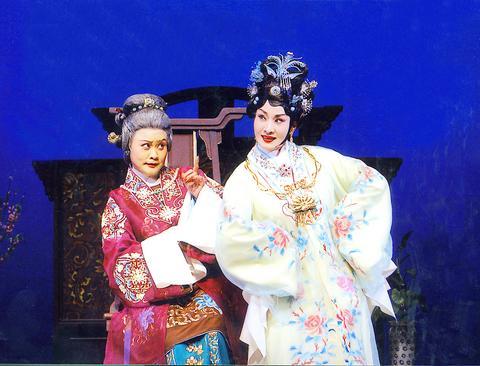The Kuo Kuang Chinese Opera Company is a bastion of Taiwan's embattled Beijing opera scene and with its most recent work, Wang Shi Fong: The Most Scheming Woman in Dreams of the Red Chamber (
Wang Shi Fong was originally scheduled to hit the boards earlier this year, but was one of many victims of the SARS epidemic. The wait has done it no harm, and the presence of Beijing opera star Wei Haimin (
The Dream of the Red Chamber, from which the story is taken, is an undisputed classic of Chinese literature and has provided material for presentation in many other media, from comic books to opera.

The character Wang Shi-fong makes for brilliant drama and the opera has many aspects akin to a social drama, making it unusually easy to watch, especially for those unaccustomed to the ponderous tragedy that dominates Beijing opera plots. Caught inside the machinations of a huge extended family, Wang fights for survival using any tools available -- most notably a sharp tongue, a wily, not to say manipulative nature, and the ability to practice the art of flattery with a flagrance and shamelessness that stuns those around her.
Wang is one of the great characters of Chinese literature, a tough woman among dissolute and weak-willed men who nevertheless control the levers of power. In a world of petty cruelty and deceit, she is unafraid to be truly evil, blighting the lives of her enemies with a masculine determination that awes the many men in her life. She is Chinese literature's super bitch, drawn by Cao Hsue-chin (曹雪芹), the author of Dream of the Red Chamber, with such incredible detail and shading that one is never allowed to forget beneath all the guile and wickedness, there is a woman fighting for her life, keeping her head above water while weaker sisters fall victim to a male dominated world.
Wei Haiming does a splendid job of interpreting Wang, walking a fine line between the formalized conventions of Beijing opera and more informal character acting. The blend is appealing and makes Wang Shi Fong a great introduction to Chinese opera. Artistic director Wang An-hsin (
Wang Shi Fong will be at the Novell Hall today and tomorrow at 7:30pm, with a 2:30pm matinee on Sunday. Tickets are NT$300 to NT$1,200 and are available from ERA ticketing and from the venue.

The canonical shot of an East Asian city is a night skyline studded with towering apartment and office buildings, bright with neon and plastic signage, a landscape of energy and modernity. Another classic image is the same city seen from above, in which identical apartment towers march across the city, spilling out over nearby geography, like stylized soldiers colonizing new territory in a board game. Densely populated dynamic conurbations of money, technological innovation and convenience, it is hard to see the cities of East Asia as what they truly are: necropolises. Why is this? The East Asian development model, with

June 16 to June 22 The following flyer appeared on the streets of Hsinchu on June 12, 1895: “Taipei has already fallen to the Japanese barbarians, who have brought great misery to our land and people. We heard that the Japanese occupiers will tax our gardens, our houses, our bodies, and even our chickens, dogs, cows and pigs. They wear their hair wild, carve their teeth, tattoo their foreheads, wear strange clothes and speak a strange language. How can we be ruled by such people?” Posted by civilian militia leader Wu Tang-hsing (吳湯興), it was a call to arms to retake

This is a deeply unsettling period in Taiwan. Uncertainties are everywhere while everyone waits for a small army of other shoes to drop on nearly every front. During challenging times, interesting political changes can happen, yet all three major political parties are beset with scandals, strife and self-inflicted wounds. As the ruling party, the Democratic Progressive Party (DPP) is held accountable for not only the challenges to the party, but also the nation. Taiwan is geopolitically and economically under threat. Domestically, the administration is under siege by the opposition-controlled legislature and growing discontent with what opponents characterize as arrogant, autocratic

When Lisa, 20, laces into her ultra-high heels for her shift at a strip club in Ukraine’s Kharkiv, she knows that aside from dancing, she will have to comfort traumatized soldiers. Since Russia’s 2022 invasion, exhausted troops are the main clientele of the Flash Dancers club in the center of the northeastern city, just 20 kilometers from Russian forces. For some customers, it provides an “escape” from the war, said Valerya Zavatska — a 25-year-old law graduate who runs the club with her mother, an ex-dancer. But many are not there just for the show. They “want to talk about what hurts,” she